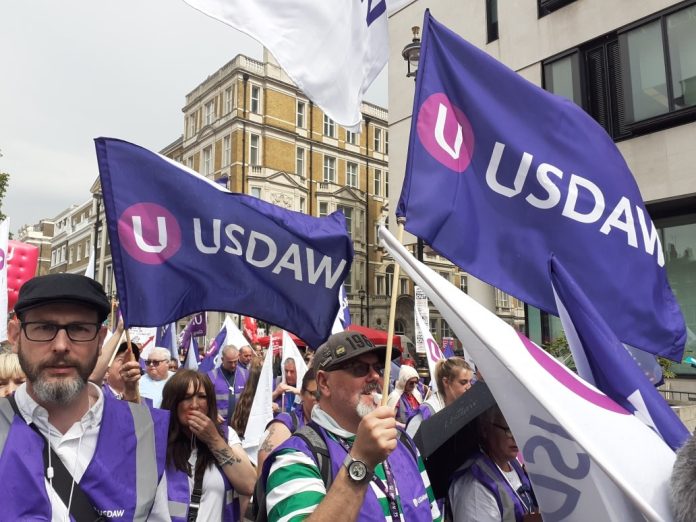Iain Dalton, Usdaw ADM delegate
Shop workers’ union Usdaw’s 2023 Annual Delegate Meeting (ADM) took place against a backdrop of waves of industrial action, as workers in many trade unions take action over the impact of the cost-of-living crisis.
It was clear at the ADM that workers in a number of warehouse, manufacturing and road haulage workplaces had rejected initial pitiful pay offers. While battles over pay haven’t led to strike action yet, many had won much more substantial offers as a result of pushing for increased pay.
The picture has been more mixed in the retail and wholesale sector, which makes up the majority of Usdaw’s membership.
In Tesco, the latest union agreement now makes provision for no contracts less than 16 hours, unless specifically requested by the worker. The company has felt compelled to pay three pay rises in twelve months due to the rising cost of living.
Nonetheless, with eye-watering mega-profits of £2.49 billion, the wages of its workers remain obscenely low, and there is no doubt that with a serious fight, Tesco bosses could be forced to pay more. Despite conference voting repeatedly in recent years to restore the right of members to vote on pay negotiations in Tesco, this has still not been fought for by Usdaw’s leadership.
At the bottom end of the spectrum is Morrisons, whose pitiful 2% pay offer was rejected by the membership, only to be imposed by ACAS through binding arbitration. A motion was passed aimed at eliminating the clause in the Usdaw’s agreement with Morrisons which mandates binding arbitration where pay offers are rejected.
This and a number of other motions around workers’ rights and the cost of living were supported by the pro-social partnership leadership of Usdaw, reflecting the pressure on them of the new industrial situation.
In contrast to some of the unions that have taken national action in the last months – such as the National Education Union, which has gained 50,000 new members and hundreds of new reps – Usdaw’s membership has fallen by around 80,000 in recent years, coupled with a decline in the base of shop stewards.
Partly due to the turnover of conference delegates, there seemed to be record numbers of first-time delegates speaking at the rostrum.
While this meant some inexperience, with some propositions without movers or withdrawn, it is clear that from this new layer a new combative generation can develop, which can help to transform Usdaw into the fighting union its members need.
As the conference went on, we found that sales of the Socialist increased, as well as people wanting to join the Broad Left – the grouping in the union which aims to bring together all those who want to campaign for a fighting, democratic union, in which Socialist Party members play a key role.
Support for Corbyn’s reinstatement lost, despite support for nationalising industries
One of the more debated motions at the conference, moved by a first-time speaker, was for the Labour whip to be restored to Jeremy Corbyn. Not a single speaker opposed this. One reported they had resigned from Labour as a result of the bar on Corbyn, while another young first-time speaker said: “I wouldn’t know what a trade union was without him”. The decision of the two Usdaw unelected officials who sit on Labour’s National Executive Committee to vote to block Corbyn from standing at the next general election came in for criticism.
The vote on the motion was narrowly lost however, following general secretary Paddy Lillis’ response to the discussion, suggesting that if Corbyn had “taken responsibility” for the EHRC report into anti-semitism within Labour, he would have had the whip restored. In truth, the right-wing majority of Usdaw’s leadership opposed Corbyn and his anti-austerity manifesto from the start, and supported Owen Smith in opposition to Corbyn in the right-wing coup attempt in 2016.
Conference passed motions calling for renationalising the water industry and Royal Mail, pledges Keir Starmer had made to win the Labour leadership in succession to Corbyn, but has since dropped. Conference also passed a motion in support of proportional representation, but Starmer has rejected this as well.
It is clear that the struggle for a fighting, democratic leadership of Usdaw needs to include fighting for a genuine, independent political voice for union members. As was raised in the debate, if Corbyn stood he could win, and be a voice for those policies.







